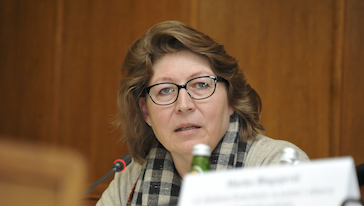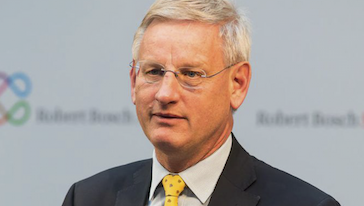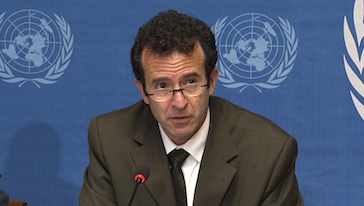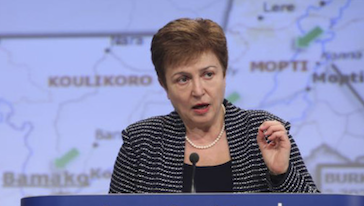
Neither the limited local infrastructure nor tried and tested social capitals can withstand the size of the present migration challenge unaided. With specialized government agencies and international organizations providing direct support to refugees and migrants, UNDP has focused on supporting its traditional partners in local government, which in so many regards have shown themselves again and again to be the – somewhat less visible – backbone of resilience at times of crises. „The refugee and migration crisis threatens years of development gains in Western Balkans and EU – border communities and local governments on migration routes key to region’s resilience”.

„We live in turbulent times.” With these words Carl Bildt, a former prime minister and foreign minister of Sweden, began his speech entitled „From Crisis to Stability” at the Department of Joumalism and Political Science at the University of Warsaw. The lecture was organised in partnership with the Faculty of Joumalism and Political Science of the University of Warsaw, and the Ronald Reagan Foundation in Poland. The event was held within the European Year for Development 2015 agenda.
In his opening remarks, Carl Bildt expressed that the world today is defined less by globalisation, and more by resurgences in geopolitical aggression and terrorism, which stand as the most significant obstacles to securing peace in the contemporary world. He discussed how conflict in the world is particularly far-reaching, and therefore requires extensive intervention on the part of the United Nations or European Union, efforts which may be diplomatic, military, or political.
Referencing his involvement in mediating a resolution at the close of the Bosnian War in 1995, he detailed the challenges of both preventing war and fostering long-term stability in war-tom regions, citing several examples which illustrate how disagreement within the international community can vastly undermine any peace-making efforts. Recounting these past experiences, MrBildt outlined several important lessons for state-building efforts in the future:
- „It is imperative to establish a secure environment very fast.” This goal requires not on1y disarming rival groups, but also compelling them to participate in a peaceful settlement. Intervening governments must be willing to escalate their military presence in the event of further hostilities because, without security, humanitarian workers will not be able to provide aid for the civilian population. These consequences became most obvious following recent wars in the Balkans, the Middle East, and Africa.
-
„The central challenge is not economic reconstruction, but state building.” The framework of a state must already be in place before focusing on projects such as physical reconstruction. Without a political solution, any efforts to rebuild will be for naught. By achieving a negotiated political settlement on the form of the state, there will at least be an opportunity for interested parties to establish cooperative relations.
- „To build a state, you need to know what to build.” The decision must be made early in the process, and it must be definitiv In a deeply divided society, state building should involve constitutional protections for all threatened groups, whether ethnic, religious, or otherwise. Competing sides also must be able to compromise in order to achieve a permanent arrangement.
- „There must be an early focus on the preconditions for long-term growth.” The future of a fledgling state is predicated onhaving early conditions that would enable economic Sanctions have historically been counterproductive because they drive away the middle class and enable black markets to form. Moreover, sanctions against governments only maketheir societies more economically fragile, more dependent on humanitarian, and more resentful.
- „There has to be a benevolent regional env” For a state to become stable, it requires stable regional neighbours that are capable of putting aside their own hostility. Regional governments must recognise the negative consequences if a neighbouring state fails.
- „The greater the international support, the easier the process.” Disagreement among foreign governments can serve to galvanise rival groups within a post-war territ Therefore, the UN as a whole, and the Security Council in particular, can avoid prolonged civil conflict by agreeing to a common approach, although this remains an enormous challenge due to the disparate interests within the international community.
- „Nation building takes a longer time, and requires more resources, than most initially believe”. Overseeing a state’s initial post-war period requires a vast amount of patience and commitment. Unfortunately, peace-keepers around the world are limited because of the many recent conflicts that require their involvement. A much greater volume of personnel are needed not only for security, but also for political and economic development, which further confirms the need for achieving an international consensus in solving these types of crises.
To illustrate the aforementioned points, Carl Bildt named a number of recent examples in which the international community failed to recognise or address the needs of states that had been devastated by war, ranging from Bosnia to Afghanistan, as well as the more recent conflicts in Syria and Libya. He emphasised that the international community must act decisively in order toprevent states from failing because the consequences may be felt anywhere in the world, as we have witnessed from the ongoing terror campaign by ISIL and the accompanying Syrian refugee crisis. He closed the lecture by asserting how urgent issues such as climate change and overpopulation make it even more crucial for governments to take a proactive approach in solving global issues together.

Our world is in the midst of one of the most intense refugee crises it has ever seen. In fact, 1 in every 122 persons in the world has been displaced due to conflict. At 60 million, this is enough to form the world’s 24th largest country. As the international community, largely unprepared, is struggling to meet the demands, Dr. Paul Spiegel of UNHCR joins #KAPtalks to argue for a new paradigm. He suggests we must go beyond the donor-assistance system to one in which refugees must be given cash, bank accounts and health insurance.

The event was open by the Rector of Sofia University Prof. Ivan Ilchev, who underlined the significance of the issue of development for Bulgaria and the world as a whole.
After the opening words Commissioner Georgieva delivered a lecture on the topic: “Influence of the Changing World Over the European Reaction to Crises”. She presented the current trends of economic development around the world with an emphasis on the growing risks of instability fueled by natural and social cataclysms in Middle East, Africa, and some areas in Southeast Asia and Latin America. The Commissioner analyzed the ongoing conflict in Libya as a case study and explained the measures undertaken by the European Union such as:
– Evacuation of the European Citizens,
– Humanitarian operations,
– Coordination mechanisms.
She paid special attention to the increasing number of natural disasters in the world in 2010, mainly connected with climate issues (90%), among which several mega disasters, as well as large-scale industrial accidents. Apart from climate change, the other major factor for the growth of crises worldwide appeared to be the growth of population and the resulting high levels of unemployment. The third outlined factor is growing urbanization.
Complex crises were discussed as well. In response to the complex crises, Georgieva presented a complex model for counteraction based on humanitarian aid networks, uniform system for reaction, complex risk prevention, and aid aimed at development.
Following Mrs. Georgieva, Sir Simon Maxwell made a short outline of the works of Ryszard Kapuscinski. He stressed on contemporary humanitarian risks and their impact. Given the complexity of the interconnected risk factors, Maxwell suggested a global partnership for development based on open and stable trading and financial systems, special attention to the least developed areas especially concerning their debts, access to medications and new technologies. In the framework of such partnership, Europe has a comparative advantage. In conclusion, Sir Maxwell presented the attitudes of European citizens towards the provision of foreign aid and the future benefits for the world from providing aid for sustainable development.
The third speaker, Mr. Andrey Kovachev, MEP, presented the role of Bulgaria in the process of development as well the tasks the country should undertake in that field.



